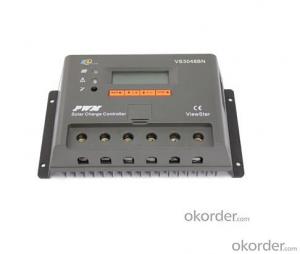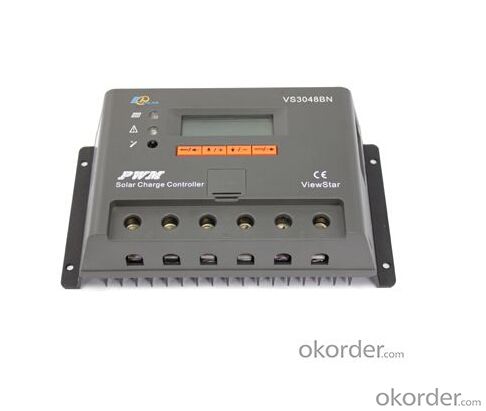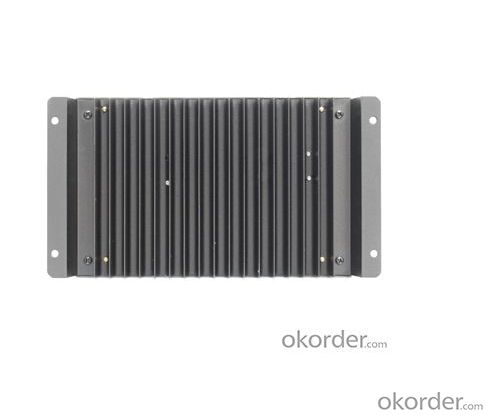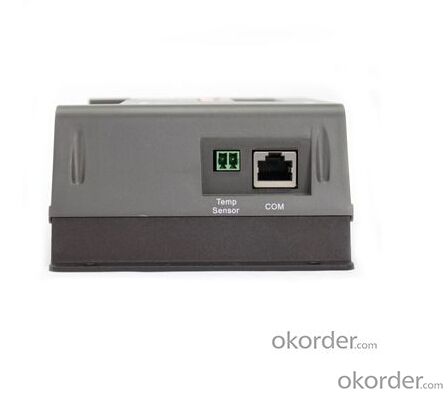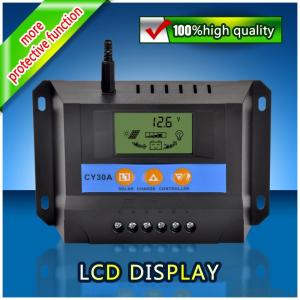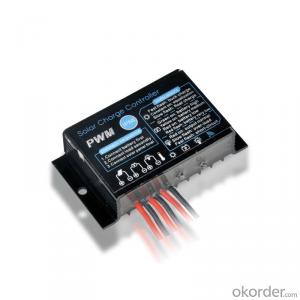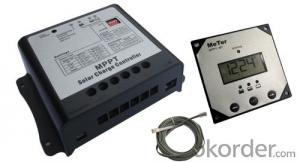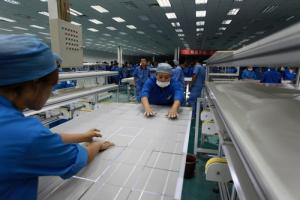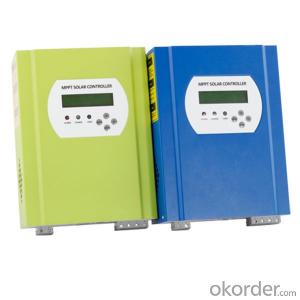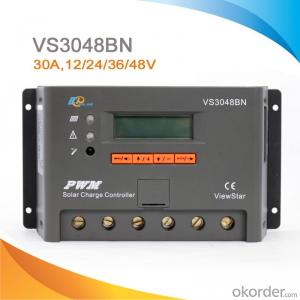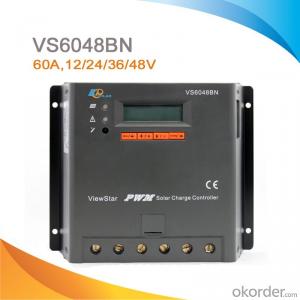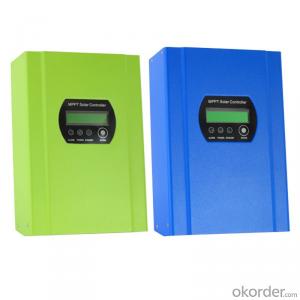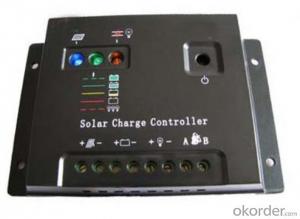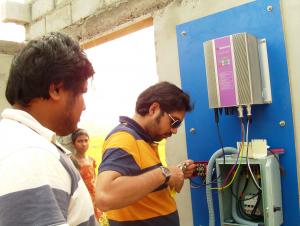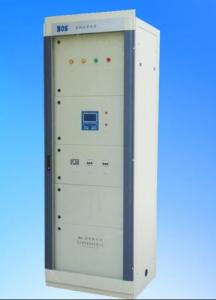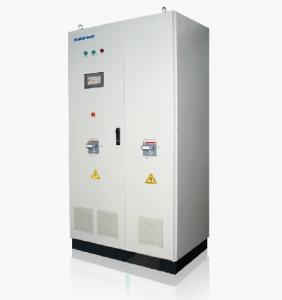Solar Pool Heater Controllers - Solar System Charge Controller / Regulator 30A 12/24/36/48V
- Loading Port:
- China main port
- Payment Terms:
- TT OR LC
- Min Order Qty:
- 10 pc
- Supply Capability:
- 10000 pc/month
OKorder Service Pledge
OKorder Financial Service
You Might Also Like
LCD Display PWM Solar System Charge Controller /Regulator 30A 12/24/36/48V,VS3048BN
1. Product Description:
ViewStar series solar controller is our new generation controller for off-grid solar system, such as street light, solar home system or small power station etc.
2. Features:
1).Excellent EMC design
2).32 bit MCU with high speed
3).High efficient Series PWM charging
4).Four battery type options: Sealed, Gel, Flooded, and USER
5)Intelligent lighting and timer control for solar lighting system
6).12 bit A/D high-precision sampling to ensure accuracy
7).Use MOSFET as electronic switch
8).Full control parameters setting and modification, diversified load control mode
9).Humanized design of browser interface, undertake every operating conveniently
10).Temperature compensation
11).Adopt graphics dot-matrix LCD screen and HMI (human-machine interface) with 4 buttons, integrated menu displaying and operation
12).Energy statistics function
13).RS485 ports with MODBUS communication protocol
3. Electronic Protections:
·PV short circuit protection
·PV reverse polarity protection
·Battery overcharge protection
·Battery over discharge protection
·Battery reverse polarity protection
·Load overload protection
·Load short circuit protection
·Overheating protection
4. Specification:
Model | VS2048BN | VS3048BN | VS4548BN | VS6048BN |
Nominal system voltage | 12/24/36/48V auto work | |||
Rated battery current | 20A | 30A | 45A | 60A |
Rated load current | 20A | 30A | 45A | 60A |
Max. battery voltage | 64V | |||
Equalize charging voltage | Sealed: 14.6V, Flooded: 14.8V, User-defined: 9~17V | |||
Boost charging voltage | Gel: 14.2V, Sealed: 14.6V, Flooded: 14.8V, User-defined: 9~17V | |||
Float charging voltage | Gel /Sealed /Flooded: 13.8V, User-defined: 9~17V | |||
Low voltage reconnect voltage | Gel /Sealed /Flooded: 12.6V, User-defined: 9~17V | |||
Low voltage disconnect voltage | Gel /Sealed /Flooded: 11.1V, User-defined: 9~17V | |||
Self-consumption | ≤15mA(12V); ≤10mA(24V); ≤9mA(36V); ≤8mA(48V) | |||
Grounding | Common negative | |||
Temp. compensation | -3mV/°C/2V | |||
Relative humidity | 10%~90% Non-condensation | |||
Communication | RS485 / RJ45 interface | |||
LCD temperature | -20°C ~ +70°C | |||
Working temperature | -25°C ~ +55°C | |||
Humidity | ≤95% N.C. | |||
Enclosure | IP30 | |||
Overall dimension | 200x103x58mm | 201x109x59mm | 205x119x67mm | 205x174x64mm |
Terminals | 16mm2 | 35mm2 | 35mm2 | 35mm2 |
Net weight | 0.7kg | 0.9kg | 1.2kg | 1.5kg |
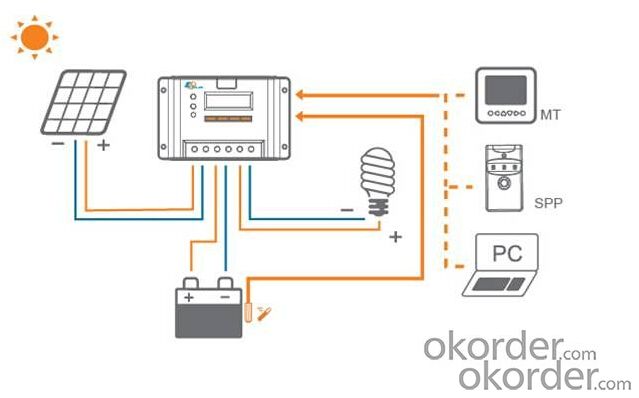
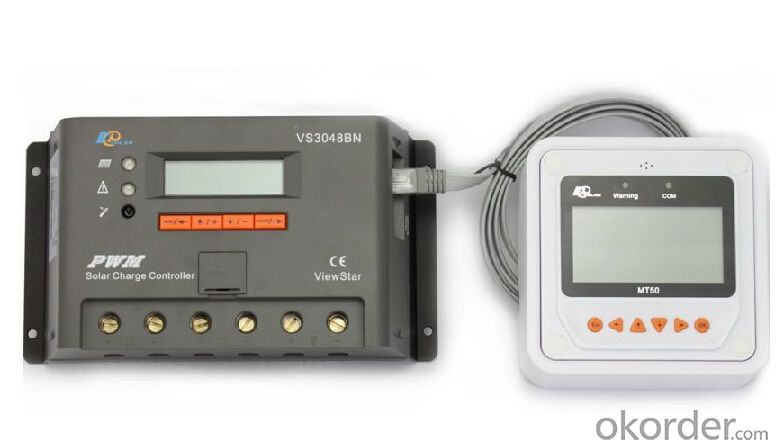
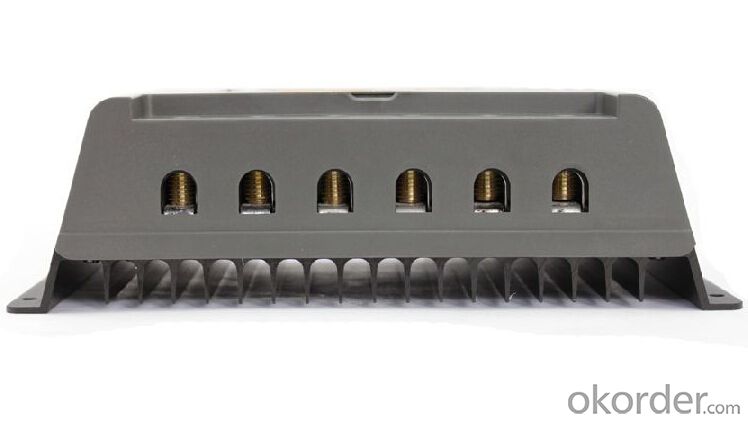
5. FAQ
Q. How many with the MOQ?
A.100PCS
Q, What is the payment method:
A.T/T,L/C
Q, how long with the date of order
A. About 15-25 Days
Q. Where are you main market?
A. Our main market is South Africa and we provide more service to Southeast Asia, Middle East and South America.
Q: What are your certification?
A.CE, ISO, CCC
Q: How long with your warranty.
A. We offer inverter, solar lighting , solar generator one-years warranty ,Sola panel warranty 20 years.
Q: How about with you scale of factory ?
A.We are bigger OEM ( Original Equipment Manufacturer). We have 500 workers and managers .
- Q: Can a solar controller be used with solar-powered weather stations?
- Yes, a solar controller can be used with solar-powered weather stations. A solar controller is a device that regulates the charging and discharging of batteries in a solar power system. It ensures that the batteries are charged efficiently and protects them from overcharging or discharging. In the case of solar-powered weather stations, a solar controller is often used to manage the power generated by the solar panels and to charge the batteries that store the excess energy. This ensures that the weather station can operate even during periods of low sunlight or at night when there is no solar power generation. By using a solar controller, the weather station can optimize its power usage and extend the lifespan of the batteries by preventing them from being overcharged or completely discharged. It also provides protection against electrical surges and other potential issues that may arise in a solar power system. Overall, a solar controller is an essential component for managing and maintaining the power supply in solar-powered weather stations, ensuring their reliable operation and continuous data collection.
- Q: What is the maximum discharge current that a solar controller can handle?
- The maximum discharge current a solar controller can handle is determined by the specifications and capabilities of the particular model in use. Solar controllers are designed to regulate the current flow between the solar panels and the battery or load. Typically, they have a rating for the maximum discharge current, indicating the safe level at which the battery or load can be discharged. This rating ensures that the solar controller does not become overloaded and maintains efficient system operation. To determine the maximum discharge current a solar controller can handle, it is important to refer to the manufacturer's specifications or user manual. These documents provide detailed information about the controller's maximum discharge current rating, usually expressed in amps (A). Adhering to this rating is crucial to prevent damage to the controller and maintain the system's performance and longevity. Furthermore, it is important to note that the maximum discharge current may vary based on the type and size of the solar controller. Different models may have different capabilities due to their design, components, and intended applications. Thus, consulting the manufacturer's guidelines is essential for accurately determining the maximum discharge current for a specific solar controller.
- Q: How to adjust the solar controller
- Charging and overpressure indication: When the system is connected normally and the sun is exposed to the photovoltaic panel, the charging indicator (1) is green, indicating that the system charging circuit is normal; when the charging indicator (1) Description of the system over-voltage, the treatment see the fault handling content; charging process using the PWM method, if there have been over-discharge action, the charge must first increase the charging voltage, and keep 10 minutes, and then down to the direct charge voltage, Live activation of the battery, to avoid sulfide crystallization, and finally dropped to the float voltage, and keep the float voltage. If there is no over-discharge, there will be no way to enhance the charge to prevent the battery water loss. These automatic control processes will allow the battery to achieve the best charging effect and to ensure or extend its service life.
- Q: Can a solar controller be used with a solar-powered car charger?
- Yes, a solar controller can be used with a solar-powered car charger. A solar controller helps regulate the charging process by preventing overcharging and optimizing the energy flow from the solar panels to the car battery. This ensures that the car charger operates efficiently and protects the battery from damage.
- Q: What is the purpose of the maximum power point tracking feature on an MPPT solar controller?
- The MPPT feature on an MPPT solar controller aims to optimize the efficiency and output of the solar panel system by constantly monitoring and adjusting the voltage and current to operate at the maximum power point (MPP). This ensures that the system harvests the maximum available energy from sunlight, even when environmental conditions change. By tracking the MPP, the MPPT controller improves energy production and overall system performance. Additionally, the MPPT feature allows the solar panel system to be more versatile and efficient in different applications. It enables the conversion of excess energy into usable energy for charging batteries or powering other devices, making it compatible with various battery charging requirements. This versatility makes MPPT solar controllers suitable for off-grid systems, hybrid systems, and grid-tied systems with battery backup. In conclusion, the MPPT feature on an MPPT solar controller optimizes the power output of the solar panel system by continuously tracking the maximum power point. It ensures high efficiency, maximizes energy production, and improves compatibility with battery charging requirements.
- Q: What is the purpose of the battery temperature compensation feature on a solar controller?
- The purpose of the battery temperature compensation feature on a solar controller is to ensure the optimal charging and discharging of the batteries regardless of the surrounding temperature. This feature adjusts the charging voltage based on the battery's temperature, preventing overcharging in high temperatures and ensuring sufficient charging in low temperatures. By maintaining the correct charging voltage, the battery temperature compensation feature helps prolong the battery's lifespan and improves overall system efficiency.
- Q: Can a solar controller be used with solar panels of different technologies?
- Yes, a solar controller can be used with solar panels of different technologies. A solar controller acts as a middleman between the solar panels and the batteries or electrical loads, regulating the flow of energy. It is designed to work with various solar panel technologies, such as monocrystalline, polycrystalline, and thin-film, ensuring compatibility and efficient energy conversion regardless of the panel type.
- Q: How do I protect a solar controller from moisture and humidity?
- To protect a solar controller from moisture and humidity, you can take several precautions. Firstly, ensure that the solar controller is installed in a dry and well-ventilated location. Avoid placing it in areas prone to water leaks or excessive humidity. Additionally, consider using a weatherproof enclosure or a protective cover specifically designed for solar controllers. These covers can help shield the controller from moisture and humidity while still allowing for proper airflow. Regularly inspect and maintain the controller, checking for any signs of moisture or condensation buildup, and promptly address any issues to prevent damage.
- Q: Can a solar controller be used with solar-powered indoor transportation hubs?
- Yes, a solar controller can be used with solar-powered indoor transportation hubs. A solar controller regulates and optimizes the electrical energy produced by solar panels, ensuring efficient charging and proper utilization of the energy in the transportation hub. This helps maintain a reliable power supply and manage the energy demands of various systems within the facility.
- Q: What are the key features to look for in a solar controller?
- The key features to look for in a solar controller include maximum input voltage and current rating, efficiency, battery compatibility, charging modes, load control capability, temperature compensation, and communication options.
Send your message to us
Solar Pool Heater Controllers - Solar System Charge Controller / Regulator 30A 12/24/36/48V
- Loading Port:
- China main port
- Payment Terms:
- TT OR LC
- Min Order Qty:
- 10 pc
- Supply Capability:
- 10000 pc/month
OKorder Service Pledge
OKorder Financial Service
Similar products
Hot products
Hot Searches
Related keywords
